- Hey Dullblog Online Housekeeping Note - May 6, 2022
- Beatles in the 1970s: Melting and Crying - April 13, 2022
- The Beatles, “Let It Be,” and “Get Back”: “Trying to Deceive”? - October 22, 2021
NANCY CARR * A study just issued by researchers at Imperial College London and Queen Mary University of London asserts that the Beatles’ success in mid-60s America was anything but revolutionary. According to Professor Armand Leroi, the paper’s senior author, “They were good looking boys with great haircuts and British accents but as far as their music was concerned they weren’t anything new.”
“Yeah-huh,” as those of us raised in Texas sardonically respond to transparently idiotic statements (at least when we’re trying to be polite).
The researchers decided that the Beatles weren’t up to anything new because chord progressions, lyrics, and beats in American music of the early 1960s have similarities to the Beatles’ music. As Leroi explains it in this Telegraph article:
“The music historians all talk about how the Beatles came to America and changed everything but it’s entirely coincidental. They didn’t make a revolution or spark a revolution, they joined one. The trend is already emerging and they rode that wave, which accounts for their incredible success. The United States was already becoming rockier and more energetic, and moving away from mellow sounds like doo wop. You can already see that by the beginning of the 1960s.”
At one level this makes sense — I don’t believe any artist, in any genre, has managed to create something ex nihilo. It’s what an artist does with what he or she encounters in the culture and the existing tradition that makes the difference. But claiming that the Beatles didn’t have a revolutionary effect because other musicians were exploring adjacent territory is next-level bonkers.
Mark Lewisohn more diplomatically says the findings “didn’t stack up.” He remarks that people who were actually there when the Beatles broke in America know that “the Beatles revolutionised everything.”
In another Telegraph piece responding to the study, Neil McCormick remarks that there is “something very pompous and disdainful” about the researchers’ dismissal of the Beatles’ influence. He adds
that saying there is no absolute revolution in music, only incremental progression, is “surely the latest dispatch from the department of the bleeding obvious.” (No one can do astringency quite like the Brits, IMO.)
I think the best refutation of the London study is that people in 2015 are not only still talking about the Beatles, but still listening to and covering their music–including many who, like me, weren’t born when the band appeared on the Ed Sullivan Show in 1964. Their music has a power that can’t be quantified. You can analyze the songs, but in the process of taking apart the chords and beats, the analyzer had best remember that the whole has a spirit that can’t be measured with the standard instruments. As Wordsworth put it, “Our meddling intellect / Mis-shapes the beauteous forms of things: — / We murder to dissect.”


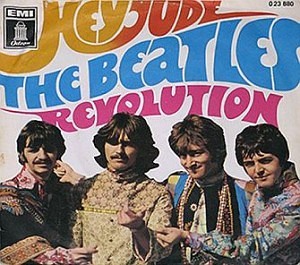



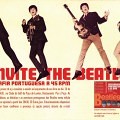


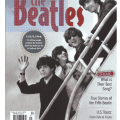
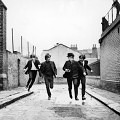
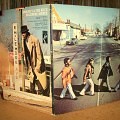
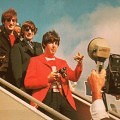


The original article is here: http://rsos.royalsocietypublishing.org/content/royopensci/2/5/150081.full.pdf
As usual the media, and the scientists who respond to media presentation of scientific articles in mainstream media instead of the articles themselves, misrepresent the conclusion about the influence and lack the competency to explain the research outcome in the wider context of the culture.
I suggest we discuss the research report and not the media representation. Beforehand let’s be aware of our personal presuppositions, and differentiate these from the more objective way of presenting and testing arguments, even though this is sometimes contested here.
There are two unvalidated assumption that Beatles-fans often use to present the case of the uniqueness and big influence of the Beatles, and these were frequently contested by The Beatles themselves, and that includes Lennon, McCartney and Harrison.
1. The Beatles were innovators of sound… (Read David Byrne’s book How Music Works – http://en.m.wikipedia.org/wiki/How_Music_Works )
2. people still listen to their music ( so what, how many people use sound and musical aspects from the Beatles today? And compare that to the musical aspect of HipHop and Rap that are used today?)
Anyway I am looking forward for an exchange about the article which represents significant research.
Thanks for the link to the full article, Rob. I’m adding it to the post.
Having read the full presentation, I agree that the focus on breaking down topics, tempos, etc. in popular music can add something to our understanding of how that music developed. But Leroi’s claims about the Beatles (in the Telegraph piece, not in the study itself) highlight, for me at least, what this kind of analysis can’t reach. Art of any kind that endures and speaks across generations possesses a charge that I believe is finally ineffable.
If we add the researchers’ quantifiable data to an understanding that is also informed by aspects that are less quantifiable or not quantifiable at all, well and good. My objection is to thinking the quantifiable is capable of telling the whole story.
@Nancy wrote:
This is right on. And in fact has to be correct, otherwise the code would’ve been cracked, and much much more art would speak across generations. From a purely commercial point of view, corporate producers spend billions of dollars and probably just as many person-hours trying to create art that speaks across generations, because that is by far the most profitable kind of art to create. So if strict analysis could yield that result, we’d live in a very different cultural world. For one thing, phenomena like The Beatles would be much less remarkable.
To me, it’s like counting pot shards at the bottom of the Mediterranean — that can tell us about shipping routes during the period 200 BCE – 200 AD; that’s useful information and very worthwhile and I’m glad someone is collecting it. But it doesn’t tell us how it felt to be a person living in the Roman Empire.
@Michael I did not find anything in the research-article suggesting that analysis would be helpfull to create change and succes, yet a lot of producers know that if they are able to catch the wind, they win, once in a while.
In the UK parlophone, Epstein and George Martin sold more from other artists riding the wave from the mersey sound etc.
It doesn’t all come down to creativity and luck alone.
@Rob, that is certainly true.
I’m too lazy to reference all the reasons that “researcher” is a fecking idiot. But he is.